TL;DR? It’s a quagmire, essentially. But let’s dive in. Possible strong language ahead, and copious footnotes with links to much more information below.
scalper
noun [ C ] US informal /ˈskæl.pər/ (UK: tout)
- someone who buys things, such as theatre tickets, at the usual prices and then sells them, when they are difficult to get, at much higher prices: “A scalper offered me a $20 ticket for the concert for $90.”
We got tickets for Oasis, and it wasn’t easy. In fact, it was an absolute pain in the arse. There seems to have been a change in the ticket buying, selling, scalping, and reselling landscape of late, or the nature of this event has just brought it to my attention.
Doing some research around this all suggests it’s always been bad, and yes it has always been bad. But this bad? I’m not so sure. I’d speculate it’s now so easy to put together something to automatically poll for (and purchase) tickets, that anyone who is after them can do it and anyone who wants to scalp can do it as well.
The consequence of all this is that a ticket can be resold multiple times. Originally, which is then listed for sale ethically, then snapped up by a scalper, then reduced to sell nearer the event, then grabbed by another scalper, then sold once more to a genuine fan again. All the while the platforms are taking obscene amounts of fees every time that single ticket sells and sells again.
Here’s some observations from the experience of trying to purchase Oasis tickets, and the platforms we ended up looking at to do this.
Ticketmaster
Part of me feels sorry for Ticketmaster (or Live Nation, it seems). I believe they have a shit tonne of technical debt that would make even the most seasoned senior nope out before getting beyond the first interview. This includes such madness as a custom operating system built on top of VAX that is holding up most of the backend.
Given the age of these systems it’s all now layers of emulation. They’ve tried to rewrite it more than once but never get anything close enough to the existing implementation in terms of performance and reliability1.
Part of me wonders if that might be an interesting challenge, but the other part wonders why they don’t just fix these with a sledgehammer. Radiohead recently announced shows and worked to reduce the inevitable stampede by way of a two stage lottery; you had to first register an interest, with a verified mobile number and email address and then, if you were lucky, you were sent a code that allowed you to join a queue on the day of the sale.
A moderately high bar to those that automate scalping, with an aspect of a lottery to reduce scalping even more. That system brought the queue size down to manageable numbers and did cut the scalping markets. Not completely, but significantly given the number of tickets on the resale sites was, and remains, relatively low:
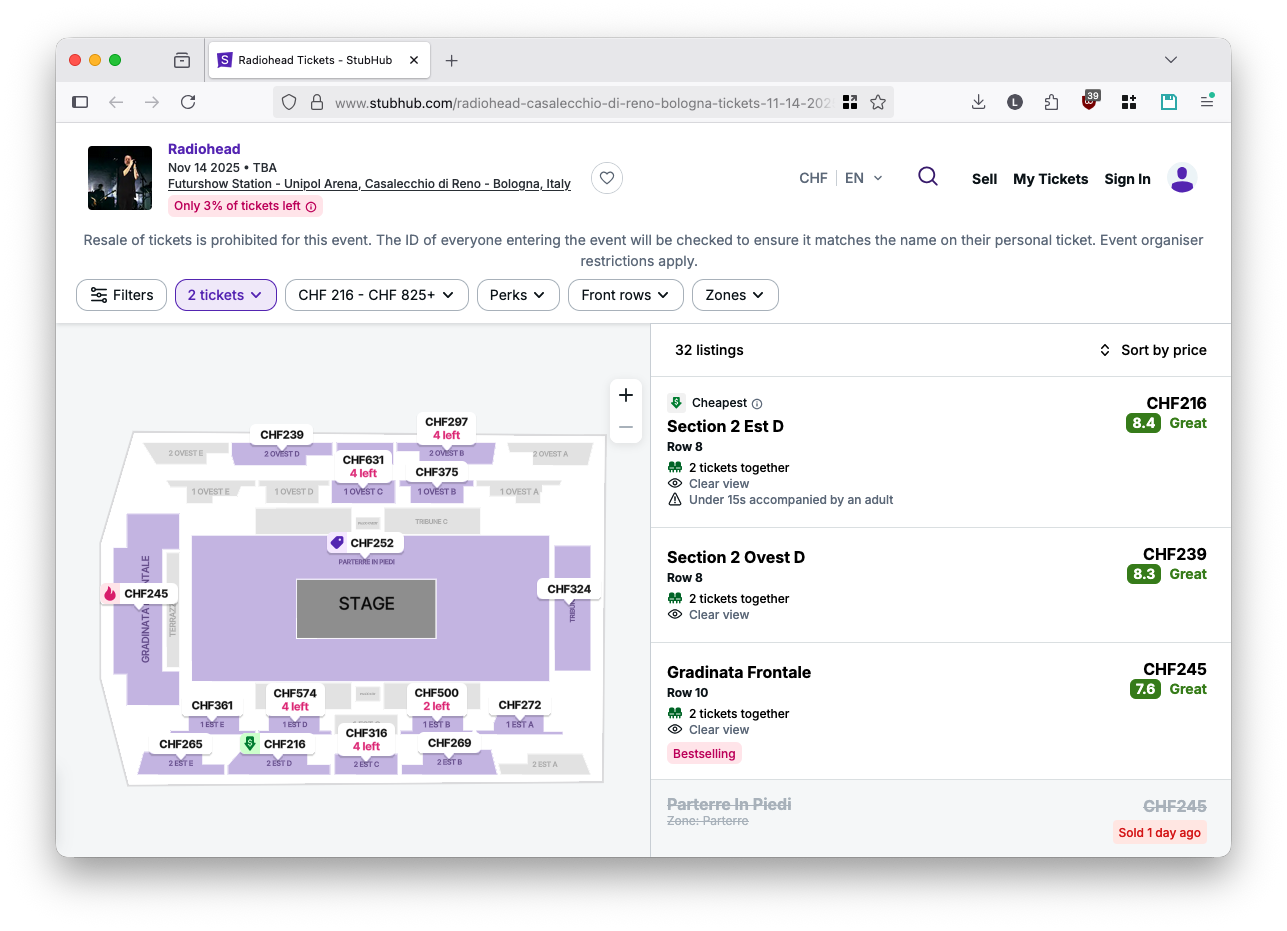
Note - dozens, rather than hundreds, and being sold at relatively low prices. Also note the warning that “Resale of tickets is prohibited for this event. The ID of everyone entering the event will be checked to ensure it matches the name on their personal ticket.” … Resale of tickets is prohibited says the resale site. Eh? More on this below in the Stubhub section.
The final part of me assumes Ticketmaster just doesn’t care. Their platform can handle the load, and they make gobs of money so why fix the non issues? Sure, the site can struggle sometimes, but that’s transient. The tickets will get sold eventually. Why worry?
The experience with Oasis was about the same as most in demand events - join a queue and then hope there’s something left when you get to the end of it. The queues were absurd in size. Hundreds of thousands in line for a venue of a tenth of that capacity, with most in the queue likely buying multiple tickets.
The double punch was that at the same time we were sat in the queue, some minutes then hours after the sale opened, we saw thousands of tickets being sold on resale sites. Scalped in seconds, then listed at hugely marked up prices before the official ticket sales had even sold out2.
So we didn’t get tickets out of this system when it opened for sales over a year ago. We weren’t massively bothered, oh well we won’t see them. Then a work event coincided with the final gigs at Wembley in September 2025. Thus began the attempts to get some on the resale market.
Stubhub
A resale site with no limitations. Tickets sold out on the primary sales platform? Try a resale site where you can find them at ten times the price. Hmm, right… And I mean ten times the price. Oasis tickets for the general admission floor standing areas in Wembley were selling at, minimum, 600 GBP. Seated 1,000 GBP+. Absurd.
What I find particularly irksome is that Stubhub will allow listings of tickets from the moment the official sales open. If this is supposed to be a fan resale site, why isn’t there at least some sort of delay? A week after the official sales open? A day? A few hours? Something? A genuine fan doesn’t buy four tickets and then immediately relist them at ten times the price. Stubhub is aiding the scalpers.
I’ve had a script for a while that will watch Stubhub and alert me when tickets appear below a certain price3. This is to work around the lack of support for alerts in Stubhub’s platform. I set the price to a reasonable amount, about 250 GBP for floor standing tickets. Still high, but not absurd.
The script merely alerts me, it doesn’t do anything to add tickets to a basket, purchase them, etc. Just a headsup that some tickets are listed. So I setup an alert for Oasis tickets, specifically for the general admission floor standing areas in Wembley. In other words the cheapest tickets.
I actually did this not long after the first sales opened, in the hope that we might grab tickets and then we could plan a trip. It’s always been a useful script, but absolutely nothing came out of it this time. The script didn’t alert me once. Resale tickets for this event were all listed so high that it was never going to succeed.
No luck on Stubhub.
Twickets
Twickets are one of the ethical resale sites, and they make a big point of this fact in their marketing spiel. The problem, which became clear with this event, is that scalpers have automated the purchasing of tickets through their site and that locks out the real fans.
To summarise: real fans who can’t make the gig sell them at face value on Twickets. Scalpers automate purchasing these and then resell them on other sites at inflated prices. This completely fucks the site’s ethos.
It’s infuriating trying to purchase through Twickets as the way it works is tickets are listed until their purchase is confirmed, and adding them to a basket holds a lock on them for ten minutes. The scalpers have automated this such that their bot will add to the basket, giving the scalper the option to get in front of the screen to complete the purchase.
Sometimes the scalper can’t get to whatever device they need to in time. So what happens? The tickets are available to grab again and their own bot, or another bot, or one of many other bots, adds to their basket and holds the lock on the tickets again. Rinse and repeat.
Tickets would be listed, but when you tried to purchase you were told “Looks like another fan grabbed this ticket just before you - when someone starts the checkout process, we temporarily hold the ticket so they have a fair chance to finish buying it. If they don’t complete their purchase, the ticket will be released back for others to buy.” The tickets would sit listed for over an hour, meaning they were being added to a basket, timing out, added, timing out, added, over and over again.
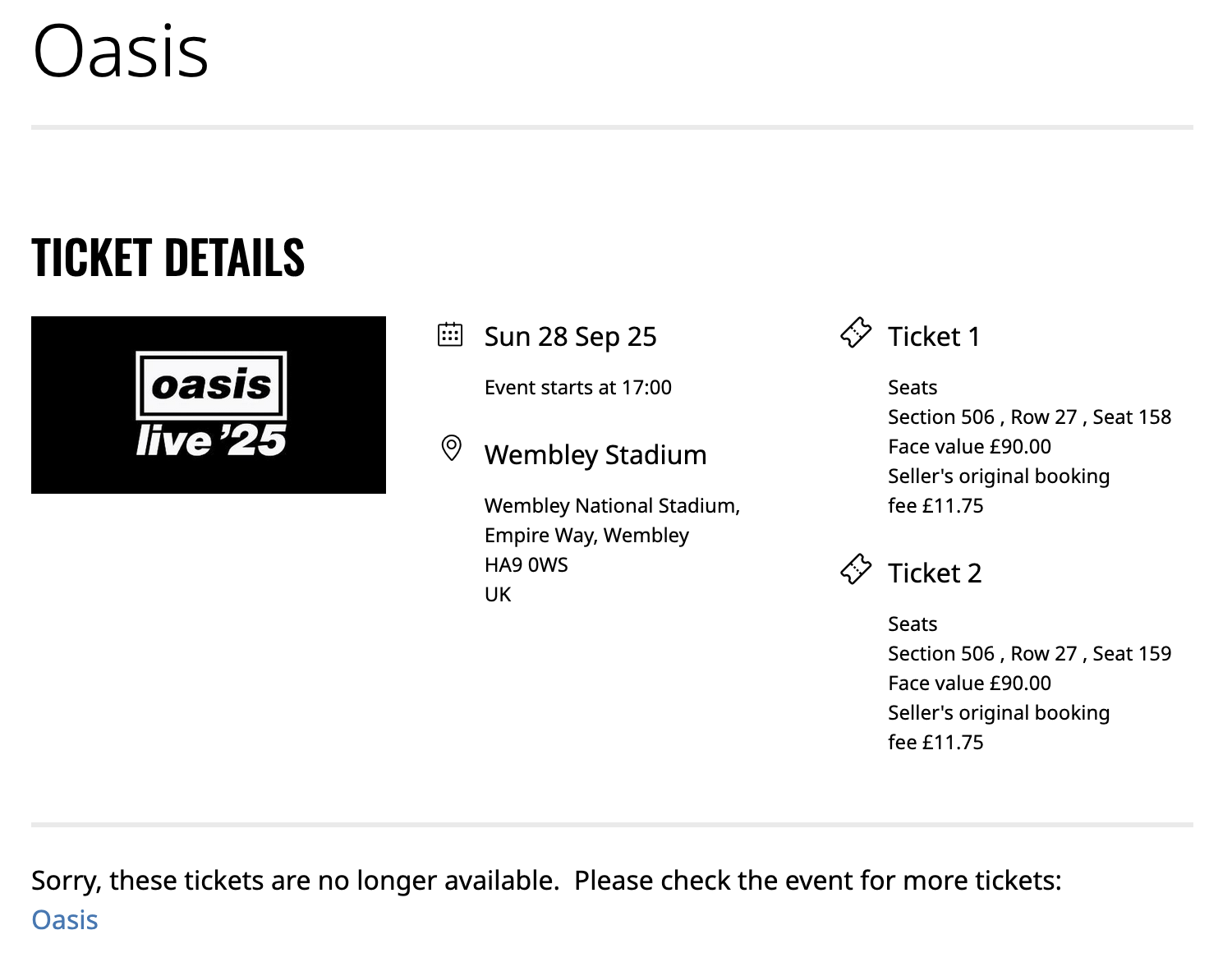
The above tickets were an example of that, eventually selling almost two hours after they were listed. Who takes this many attempts to purchase? I can understand a couple of timeouts, maybe even twice that many, but an hour and a half? Eight timeouts before a successful purchase? Bots, nothing but bots or a very lucky actual fan that manages to slip in between the cracks and hits the purchase button at the right millisecond.
90 quid tickets, on their way to being resold for a much higher price. That’s likely 1,000 quid profit for the scalper. We saw this happen multiple times, I’d say we saw twenty tickets sold at face value going to scalpers on this ethical resale site, before we gave up.
Twickets claim they have strong bot defence, but the evidence suggests otherwise and that they are failing in their mission statement4. There are technical solutions to this, and I’ll give them this suggestion for free: they don’t have alerts for in demand events, which is understandable as sending out hundreds of thousands of notifications, emails, etc, is costly and would lead to a stampede to their site causing more problems.
Instead they should send out notifications in batches - don’t list the tickets, make them only available through an unlisted unique URL, which is provided via the notification, send out small batches of notifications to randomly picked users (say, one hundred at once) at ten minute intervals, and when the tickets are sold - stop.
The key here is the URL in the notification should itself expire, meaning the bot race is eliminated. Don’t get to it in 10mins? Too late. If you chuck the ticket in the basket but don’t complete payment? Sorry, you lost your chance.
I know the above suggestion is a bit “shit Hacker News says”, but come on Twickets - sort this out as you’re more Fuckwits than Twickets at the moment.
TicketSwap
Another ethical resale site that seems to be doing better than Twickets, but I’m not convinced. They do send notifications, and they might be using batching as I talk about above to reduce load5. So fair play. However we noticed that some sellers appear to be selling multiples of tickets via this platform, as distinct listings over different hours/days/weeks, and that in itself is fishy.
Witness this seller (username removed) who we saw at least seven or eight times selling moderate value tickets via the app. At the end of the process, i.e. shortly before the gig, they had sold over twenty individual tickets. That seems off, and perhaps it was a scalper offloading.
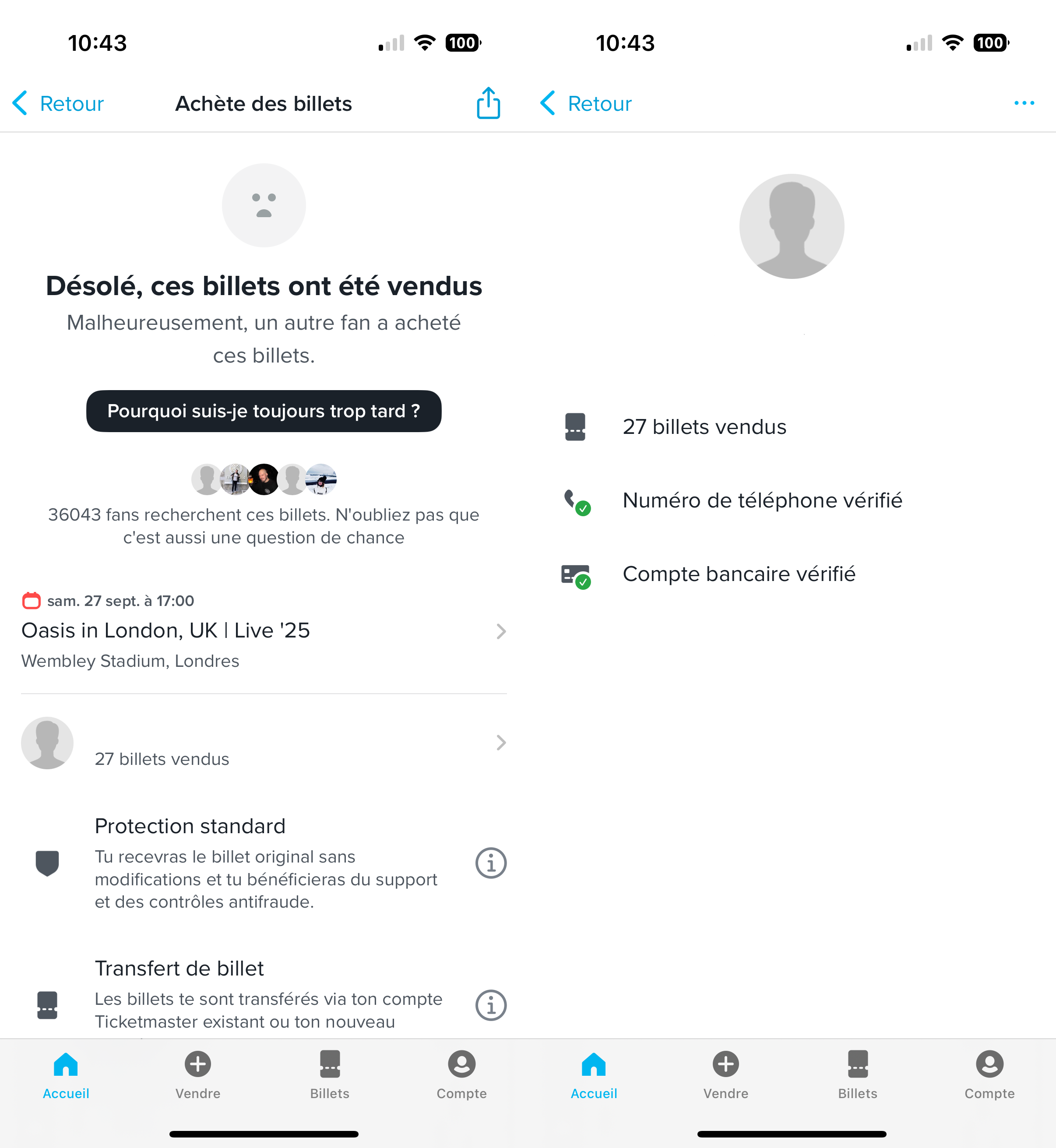
My suggestion here would be to not allow a seller to list tickets for the same event more than once, but that’s probably trivial to work around if you’re a scalper.
Reddit is full of scammers, to the point that it’s just hilarious to read their attempts to make excuses around what they’re doing. The pattern is usually an account registered very recently, perhaps a day or two, or a week or two; alternatively they have an account of much longer standing with higher karma, but they have deleted/hidden the entire submission and comment history.
Those are probably compromised accounts, and at least one I saw was playing the longer game: It started as an account registered a year ago, with the first submissions cleary karma farming in some of the larger subreddits. Get the account to some degree of trustworthiness. They pivoted to trying to resell tickets to in demand gigs about a month ago.
These scammers were typically bait and switch when it came to proving they had the tickets, or the payment method. One even claimed they had a friend at Ticketmaster and therefore couldn’t sell on the resale sites as it would get their friend into trouble. Bollocks.
I’m not saying there are no legitimate sellers on Reddit, but with in demand gigs your odds of being scammer are almost 100% so don’t risk it. I saved a couple of the threads as PDF printouts for posterity, so entertain yourself here and here if you want to.
The second thread is particularly silly as I get into an argument with a poster who is advertising their own alerting service for Twickets, which they charge for, knowing full well that there is no way it can beat the other bots. They even had a page on their own site effectively admitting this fact (Mainbotpy section). Selling a service you know to be ineffective? Another scam.
Viagogo
Where we ended up purchasing tickets. The same observations apply as for Stubhub, which is not surprising as they are the same company with different frontends, but Viagogo are particularly egregious as they don’t list tickets with their fees so you are in for a shock when you hit the final payment page. Fees came in at almost 50% of the listing amount:
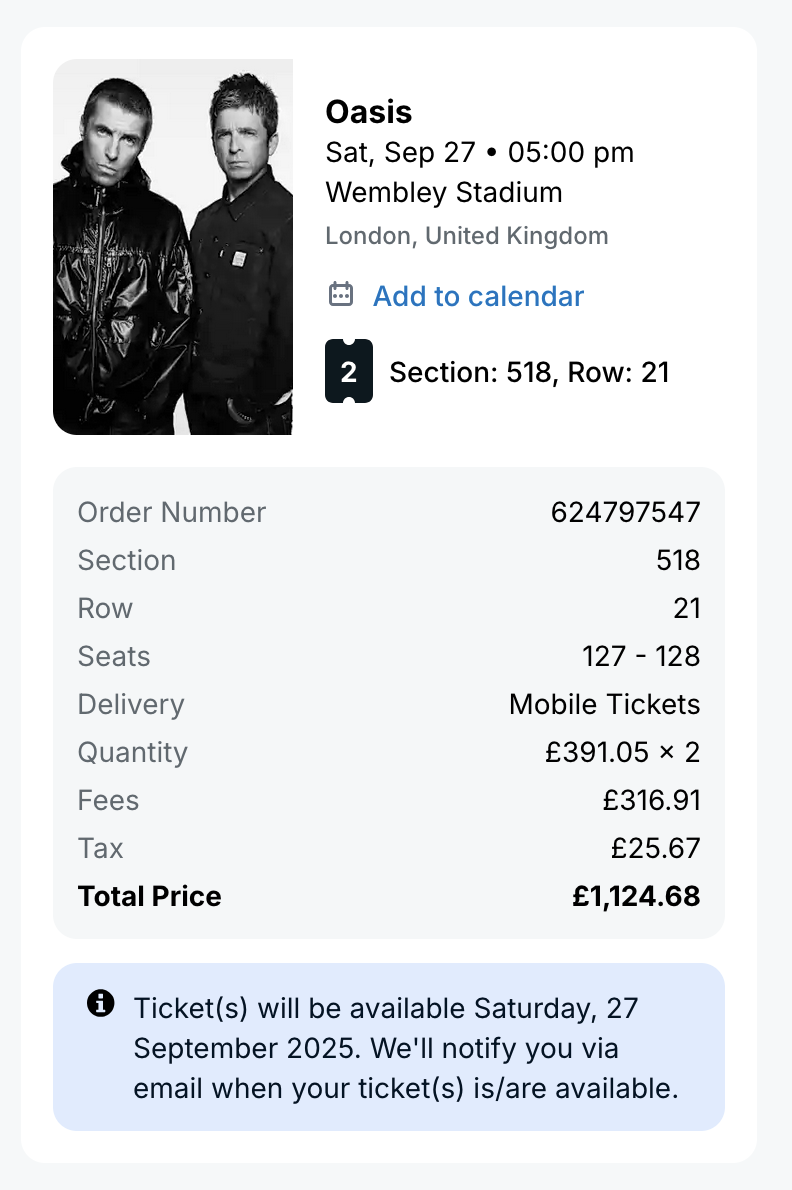
This was more than I wanted to pay at the point of purchase, but likely the least I was going to pay. The fees are a piss take.
I don’t think there’s much more to say about this one. However the interesting observation is making an incorrect assumption that prices would come down as the event got closer, with scalpers getting more desperate to offload their unsold tickets. That didn’t happen, and considering the profits involved probably never happens.
I watched the listing values slowly decrease over the period of about a week, along with the number of available tickets, and purchased two on the Wednesday before the Saturday event. I’d figured the amount of time we’d spent on this was way beyond sunk costs territory. Even if the tickets continued to decrease in price we had already lost more than their value in time.
The Wednesday turned out to be the lowest point they hit, and they started going up again reaching bonkers prices on the Friday and then even higher on the Saturday morning:
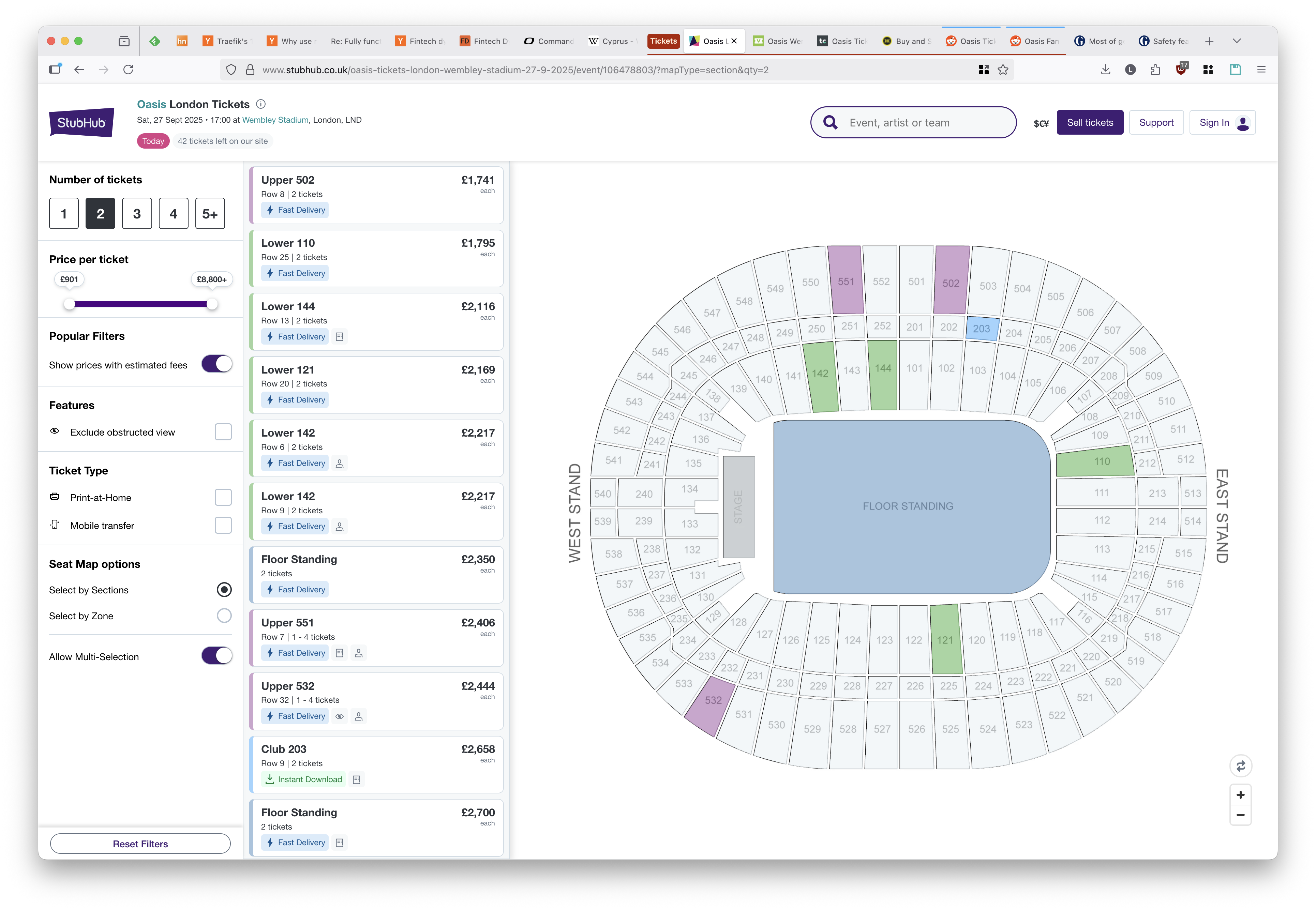
You probably can’t see it there. Just know that there were 42 tickets left on the day, with the cheapest being £1,741. The thing is, these were selling, or at least appeared that way since the number of listings reduced to dozens a couple of hours later, and then was down to single figures a couple of hours before the event.
I don’t think the bottom one here sold though:

Just Write a Better Bot?
We’re beyond that. It only takes a single scalper to ruin it for everyone, and if everyone decides to run bots to buy tickets… well, I don’t think I need to expand on why this is a terrible idea.
So What Now?
The Resale market needs killing.
Dead.
As in: no resale of tickets for events is ever possible and you just have to eat that fact. Fuck all the businesses that have built a model on gouging fans, you’re all gobshites. The lot of you. Line goes up? Fuck your line.
If you buy a ticket it should be cryptographically stored in your account in a way that cannot be shared (time linked rotating qr/barcodes like most ticket apps use these days). And it cannot be sold. Period.
You can’t make the gig, you change plans, you’re ill? Too bad.
That would stop the scalping market instantly.
And if we aren’t going to kill the resale market, how about using some recent buzzword tech to improve the situation? NF-ucking-Ts that would have some tangible use and allow artists to benefit from the resales, track how many times tickets are being resold, as well as giving information that allows identification of the scalpers so they can be named and shamed?
Do it.
Please?
-
Some information here, here, and here that notes “It runs a proprietary operating system on a proprietary emulator. Tickets are actually the equivalent of blocks on a file system. It’s incredibly complex in the way that it’s able to represent the physical layout of venues, view obstructions, language stuff, and most famously the packing algorithm.” A much more comprehensive article can be found here, which does cover some of “The Host”. ↩
-
I posted about this on Reddit at the time (archive of the thread here) and one comment suggested that the resale sites themselves are scalping for high demand events. Unproven, but it’s a possibility. ↩
-
I gave a lightning talk about this last year. The script is pretty basic, and the most interesting thing is probably StubHub building large parts of their site through JSON so it really makes this a trivial thing to do. ↩
-
Twickets do have bot defence in place, but it’s the most naive and/or simple implementation. Their thresholds for some checks are also way too high - it’s possible to sit and refresh the page every second and not see a 429 (“too many requests”) response. Many of their endpoints are also not rate limited, allowing for easy automation of polling, and their “private” API endpoints are not as private as they should be, nor are they properly secured. ↩
-
I suspect the batching is effectively done through whichever provider they are using to send the notifications to mobile devices. Some of the events (as seen in the screenshot) show 30,000+ people waiting for tickets. That’s not a massive number, but enough to cause quite a stampede should notifications appear on all those devices at once. I do assume it’s also trivial to automate grabbing the tickets after receiving the notification, but the “not all at once” delivery is going to render that process ineffective. TicketSwap may suffer from the same issues as Twickets, but that’s unproven without further investigation (I only ever use TicketSwap via a mobile app). ↩